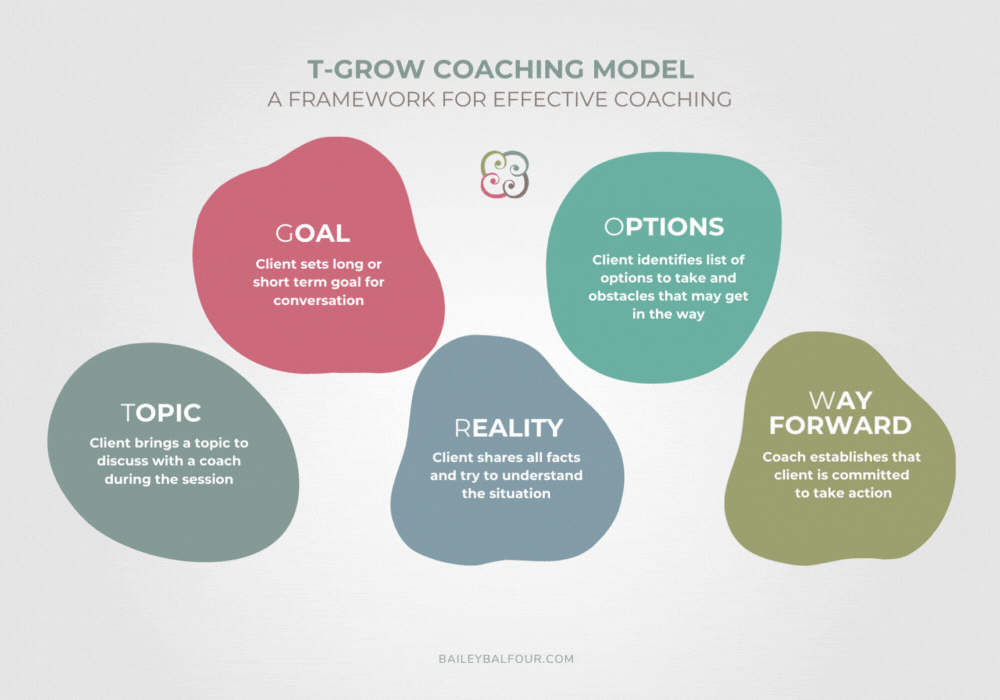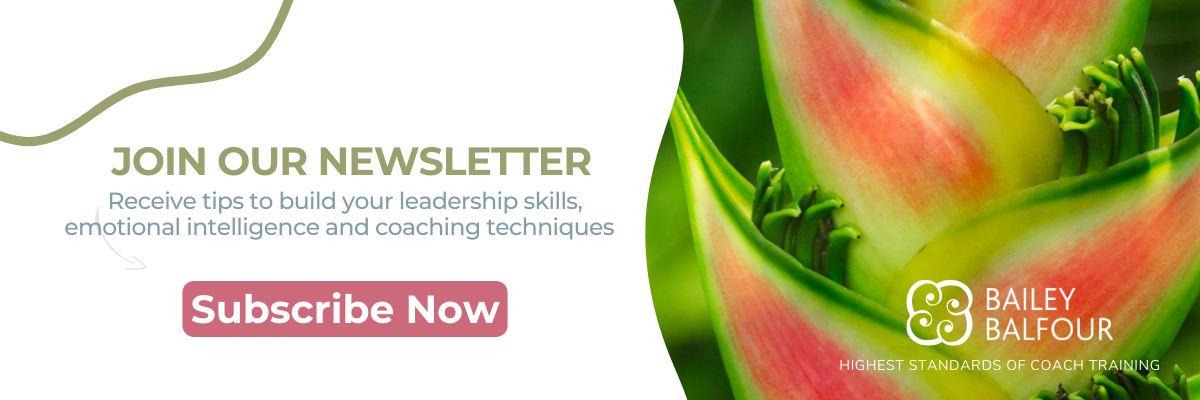
Coaching Methodology: T-GROW for Effective Coaching
This blog is part of our coaching methodologies series, where we discuss different frameworks coaches use to help clients grow. Sometimes, clients or employees might ask about the method or framework you use so it’s important to be clear about your approach so people can trust you to guide them effectively.
Our goal in this blog is to explain these frameworks in a simple way, making it easier for you to share with your clients.
What is a coaching methodology?
A coaching methodology is a systematic framework used by coaches to provide a structure to guide their clients to evoke awareness, and achieve their ideal goals.
There are plenty of coaching methodologies out there. Even though they may vary in approach, technique and application, they all share a common goal in helping clients to achieve growth and support to see real impact.
In our ICF coach certification programme, we teach our students to master a few of the coaching methodologies. One of which is called the T-GROW model developed in the 1980s by Graham Alexander, Alan Fine, and Sir John Whitmore.
How to use the T-GROW model in coaching?

If you’re new to coaching, the T-GROW model is a good starting point to stay organised. It provides a structure for the coach, within which you can coach with freedom. This tool covers all the important competencies that coaches need to apply in order to pass their ICF accreditation.
Our Level 1 (ACC) coach training also emphasises on coaching at the workplace and the T-GROW model is commonly used by managers and leaders who are beginners to coaching and helps them structure their conversations.
At its core, the T-GROW coaching model is an acronym representing five key stages in the coaching process.
Topic – Stage 1 in coaching
Coaching isn’t about us finding a solution for our clients. It’s about guiding our clients to find their own solution. But before we can do that, we need to start asking our clients what they want to explore. It’s an opportunity for them to think about where the conversation is heading and an easy way for you to kick off the discussion.
Questions you can ask: What would you like to focus on today? Or what is important to you at the moment?
Goal-Setting – Stage 2 in coaching
In coaching, the client is responsible for setting their own goals, whether it’s a short-term or long-term objective.
It’s crucial to ensure clarity on what they hope to achieve from your coaching conversation. As a coach, understanding your client’s goals is so important and we really emphasis this in our ICF coach certification programme. Sometimes, clients may come with vague topics, but without a clear goal, the conversation can become unfocused. A good coach takes time with the client to help them become clearer about what would be helpful for them.
We teach our coaches on our ICF coach training to remain in this stage until they help their clients establish a clear goal.
Questions you can ask: What would you like to achieve from our conversation? What would progress look like for you?
Reality – Stage 3 in coaching
In this stage, the coachee examines their current reality or situation. It involves an honest assessment of where they are in relation to their goal, identifying strengths, weaknesses, opportunities, obstacles.
As coaches, it’s your job to get clients to share their feelings about the situation, what they’ve attempted so far and what’s stopping them. While it may be tempting to swiftly move towards action, it’s often during this reflection on the current reality that solutions emerge.
Spend a good amount in this stage and allow your coachee to deeply consider their reality!
Questions you can ask: Can you describe what’s working and not? How do you feel about what’s done so far?
This is also the stage where more advanced coaches can use other coaching methodologies to evoke awareness and dig deeper. We teach more about this in our Level 2 ICF coach certification programme.
Options – Stage 4 in coaching
Once the coachee has a clear understanding of their goal and current reality, the focus shifts to generating potential options or strategies to bridge the gap between the two. It’s also at this stage where you can invite the client to think about obstacles.
The coach facilitates brainstorming and encourages creative thinking, helping the coachee explore different possibilities and alternatives. By no means should you be the one offering the solution! It’s through your questions that clients find the right solutions.
Questions you can ask: What else could you do? What do you think you should do first?
Way Forward – Stage 5 in coaching
In the final stage, the coachee commits to a specific action plan or way forward. The coach provides support and accountability, ensuring that the coachee remains focused and motivated to follow through with their plan.
Questions you can ask: What are the first steps you can take? What would you explore in the next 24 hours?
To sum up..
The T-GROW model is a powerful framework for coaching that empowers individuals to set meaningful goals, gain clarity on their current reality, explore options and strategies, and commit to actionable steps for growth and development.
But most importantly, it’s an easy structure that any beginner coaches can use to facilitate transformative conversations that inspire change. If you’re thinking about an ICF accreditation, the T-GROW model is one of the perfect models you can use to pass your accreditation examination for Level (ACC) Pathway. To learn more about how to become an ICF coach, click here.
If you’re interested in specialising in any of the above, we train leaders to become great executive coaches and introduce frameworks and models they can use. Find out more about our Level 1 and Level 2 ICF trainings.

Who are we?
Learn more about Bailey Balfour, who we are, our values, and how 22 years of executive coaching experience inspired our acclaimed IFC accredited training programmes. Meet our faculty and discover why you might like to learn with us.

Free Taster
One of the most effective ways to decide whether our programme is the best for you is to experience a short taster – to see what you could expect and get a feel for the different elements of our courses including mentor coaching, our self-directed resources and our learning system. You can enjoy this taster at your own pace at any time so register now.

Book a call
Having a call with Jean Balfour, our programme director, can help answer questions about our pathways in a way that is relevant to you. How will you fit it in around your schedule? How will it speak to your existing role? How could it enhance your skillset for the future in your career? Why is accreditation important? Schedule a call with Jean and answer these questions and take the next step in enrolling.

Upcoming Events and Webinars
Join us in engaging (and free) webinars – from networking to coaching skills, and purposeful questions – there is bound to be an upcoming topic that speaks to you. Register now – and don’t worry – if you can’t make the live session we will send you a recording so that you can enjoy it in your own time.
Making Sense of Work Podcast
How’s Work at the Moment? We all work – and yet we often struggle with work. Even very ambitious people find parts of work difficult. This podcast is for you if you’d like to build a new and better relationships with your working life. Join Jean Balfour and guests as they explore everything to do with our working lives, starting with how do we find our purpose, how do make sense of our organisations and what major movements are we seeing in the workplace today?
About the Author
Jean Balfour is Managing Director of Bailey Balfour and Programme Director of our ICF Accredited Coach Training Programmes. Jean is passionate about helping people to have good conversations both at work and at home. She believes that coaching is a life skill and that you never regret learning to coach.



